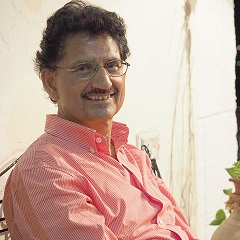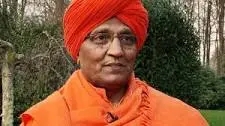By Promod Puri
Not all Hindus belong to the BJP, nor does BJP represent Hinduism in its spiritual sense.
It is with these thoughts I remember saffron-clad Swami Agnivesh, who fought for social justice on his Hindu turf instead under the Hindutva ideology of the BJP.
Swami Agnivesh, 81, who died September 11, 2020, in Delhi, was a multi-crusader social activist best known for his work against bonded labor.

He also campaigned against female foeticide. A man with a world vision of one humanity argued that people should be allowed total freedom of movement across borders by eliminating passports and immigration laws.
Swami Agnivesh was a leader of Arya Samaj, a prominent sect of Hinduism. But in 2008, he was expelled from the organization for his radical and progressive views and activities.
His most critical and controversial views were:
1. The Puri Jagannath temple in Orissa should also be opened to non-Hindus; the temple priests vigorously opposed the remarks as “purely anti-Hindu in nature,” and they burnt his effigy.
2. In May 2011, hundreds of Hindu priests protested against Agnivesh’s claim that the oval-shaped ice lingam representing Lord Shiva in Amarnath cave in Kashmir is just a piece of ice.
Swami Agnivesh’s dislike for the governing BJP and the rest of its “Parivar” or clan members for their anti-Dalit and anti-minority agenda got him physically attacked. As an “agent of Pakistan,” he was called to “go back.”
For the BJP and its ideological guideline of Hindutva, Swami Agnivesh could be a rebel, but for many, he represented the democratic and progressive sentiments and values of Hinduism.
Promod Puri
Promod Puri is the editor of progressivehindudialogue.com and promodpuri.blogspot.com.




